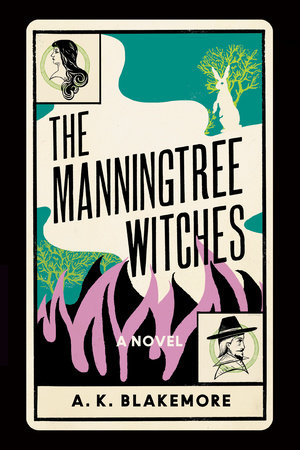
[Catapult; 2021]
Magic, like science, like war, is all about who’s in power. In The Manningtree Witches, A.K. Blakemore’s fictional but heavily-researched account of the Essex witch trials of the 1640s, power is primarily held by the absent agents of kingdom and fate. The men are sent to fight a religious war, the women are left widowed, the news is scarcely delivered, the winters are harsh, the church is ransacked, the people are hungry. This, of course, is God’s will. Those suffering powerless deserve whatever they get, which won’t be charity: “there is no such thing as hard luck, just the Lord’s ire.” Punishment, that is, for lives lived in sin, for deals made with the devil. Punishment for magic.
Rebecca, the daughter of the widowed Beldam West, is fairly powerless in Manningtree and the neighboring village, Essex. She’s a talented seamstress and a healthy woman with good hair and good skin, but poor and unmarried at twenty. The Beldam — equipped with knowledge, experience, and alcoholism — enables her family’s survival through work (laundering the clothes of those few women whose husbands haven’t been sent away, leaving them enough time to wash their clothes themselves) and wiliness (manipulating the drunk butcher, for instance, into giving her mutton on credit). The Beldam is generous with her friends, particularly the much elder, one-legged Widow Clarke, and stern with the village’s children. She has been tolerated, if not respected, for the fifteen years of her widowhood. Though she’s not a powerful woman, she has the power to keep herself, and Rebecca, and her close group of friends, alive. Then Matthew Hopkins arrives.
Hopkins, driven by a lusty hatred for the feminine that expresses itself as a begrudging admiration, a desire to understand and thus control, uses the power that comes from his mysterious background and fifteenth-century marketing genius to establish a reputation for himself as the “Witch-finder General.” With his soft-spoken assurance comes a revelation of power: who has it, who wants it, and who it can be wielded over in order to grow itself. Even in the coastal village, hierarchies exist, and when life becomes precarious, the hunger for power — especially in those who already have a taste — becomes ravenous.
Thus, the witch-hunt begins. Anyone who exercises a form of power not deemed “Godly” — that is, not bestowed upon them by generational wealth, smart marriage, or religious devotion — is sure to have made a pact with the Devil. And those without power, too; why else would God have forsaken them? This radical Puritan mindset serves to disenfranchise the disenfranchised, moving whatever morsel of power they may have held up the hierarchical ladder, and leaving them hanging by their necks.
Early in 2020, shortly before the onset of the COVID-19 pandemic that rocked (if not, unfortunately, toppled) the modern power balance, I read Caliban and the Witch, Silvia Federici’s historical reading of the transition from feudalism to capitalism through a feminist-Marxist lens. (Blakemore also cites Federici’s work in the afterword to The Manningtree Witches.) Federici reveals the ruling class’s strategy for weakening the working class, which began to gain strength after the plague reduced their number and increased their bargaining power: women, particularly herbalists, prostitutes, and widows who relied on the generosity of their neighbors to survive, became witches. Power shifted from herbalists to doctors, from prostitutes to the husbands of submissive wives, and from the elder class with its generational knowledge to a generation unaware that there was once such thing as a commons, a place where the village people gathered to grow food, celebrate their community, and make plans for collective survival. And those who were left powerless were also left with the blame for their lack of power. Where the Puritans cite “the Lord’s ire,” a contemporary criticism of the same “ungodly” members of our communities could be to blame one’s failure to hustle and grind. In fact, there’s little to distinguish the historical fiction from a contemporary account, sans the lack of climate panic, the absence of screens, and the foreignly formal language Blakemore uses both in narration and dialogue.
A quick digression, for those who have missed the news. After our modern plague demanded quarantine, a new working class began to take shape: the OnlyFans performer. Predominately women and queer people, and 90% pornographers, OnlyFans performers have leveraged the platform to earn over $5 billion collectively. A popular meme in April 2020, a month into the pandemic, was a variation on, “Say what you will about OnlyFans, but I just moved into my dream home at 22.” At least a small subset of previously disenfranchised millennials and zoomers, in front of whom the signifiers of adulthood were dangled like a carrot, were finally gaining stability. And with power comes more power — stability could mean the allocation of funds across the community via mutual aid, the time to participate in local politics, and the resources to contribute to local economies. OnlyFans performers hustled. They grinded. They provided a widely consumed commodity on their own terms. Then, on August 19, 2021, citing a requirement from payment processors and new investors, OnlyFans announced that starting October 1, pornography would no longer be an acceptable use of the platform.
This Twitter thread by @PostCultRev breaks down how the anti-trafficking movement, “an overwrought Christian anti-sex fever dream,” has led to the OnlyFans ban on pornography, by putting pressure first on politicians to pass SESTA/FOSTA, and later on payment processors like MasterCard. “The end result of the change,” writes @PostCultRev, “is it will be harder to sell sexually explicit content online unless you are part of a major player that can afford the costs to meet the new requirements. Indie sex workers will be driven out and larger companies will be more powerful.”
After a robustly vocal pushback from creators, OnlyFans “suspended” the ban, but as Delia Cai pointed out in her Vanity Fair article on the suspension, this isn’t really evidence that creators have meaningful power in their industry. It’s merely evidence that they make money for powerful people, so powerful people will allow them to stick around — for now, at least. “[OnlyFans] still dictates the terms,” Cai writes. “They’re not only the point of access to your audience; they’re also the ones deciding what metrics to use, and what counts as a success — and all of that is subject to change over any given quarter.”
Less than two weeks later, the OnlyFans drama was superseded by Texas’s Senate Bill 8, a ban on abortions as early as six weeks, before many pregnant people have any idea they are pregnant. The law effectively deputizes private citizens against anyone who aids and abets an abortion (including abortion providers and drivers who take patients to and from their appointments), by allowing Texas residents to sue clinics and individuals who participated in the abortion for at least $10,000. The bill stems from the same anti-sex evangelist attitude that led to the OnlyFans ban on sex work, an attitude that stems from the Puritanical power-grabbing plays Matthew Hopkins used in Manningtee, Essex, and the rest of England. It’s no coincidence that the Texas abortion bounty bares resemblance to Hopkins’ tactics, encouraging and rewarding regular citizens who snitch when they suspect their neighbors of witchery. Today, as in the Puritanical world of The Manningtree Witches, people with real, if fragile, power hide behind an all-powerful God, offering one group of disenfranchised people the opportunity for some small comfort for turning against their even more disenfranchised neighbors. Look over here, the powerful say. This is where your problems stem.
In The Manningtree Witches, Rebecca survives the witch trials by way of her desirability. She confesses a false power to Hopkins, illustrates an imagined bargain with the devil, and asks to be saved. Hopkins, as a mouthpiece for the stern but forgiving Puritan God, lets her survive, not least because of his own sexual fever dreams about the young woman (which Blakemore writes as deliciously lewd, enough to deserve their own cinematic reproduction). Another accused witch uses her body to bargain for blankets and candlesticks from the prison guard. Even while the women of Manningtree are stripped of their agency, crumbs of power fall through the bars of their prison cell. However bitter, these morsels satiate.
When prostitution was outlawed in the 16th century, it didn’t disappear. But where once it had been a relatively safe profession, even endorsed and encouraged by the military, it became a riskier lifestyle, a more precarious one. Prostitutes, relegated to the edges and powerless, were suddenly more likely to get sick, pregnant, raped. But despite the danger, prostitution remains a tool that can be used for survival. Similarly, an OnlyFans ban, while impacting the porn industry, would never end it. Instead, it would have removed the agency sex workers have enjoyed for the last year, weakening the working class (in tandem with a lifted eviction moratorium, an end to unemployment benefits, and a rise in COVID cases) right when we thought the odds might be shifting in our favor. And the abortion ban in Texas will not end abortions in Texas; it will push them into dangerous, dark corners, and instead will end more lives.
Blakemore’s novel, as Rebecca Tamás puts it, “makes the past breathe,” with a captivating ferocity of language, deftly wrought characters, and richly spooky images that tell a story I couldn’t put down despite the dreaded ending I knew I was in for. But the past breathes whether Blakemore brings it to life or not. The present moment is a continuation of the past. We are here because we were there. We are still there.
Hannah Lamb-Vines reads and writes in New York City, northern California, and the Texas panhandle, depending on the time of year. Her work has recently been featured or is forthcoming in Columbia Journal, HAD, and Black Telephone Magazine, among others.
This post may contain affiliate links.







